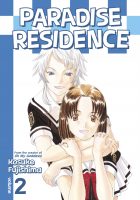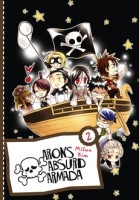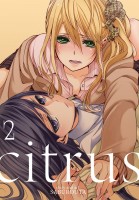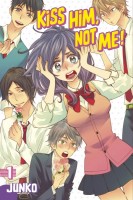My News and Reviews
The end of August has come and gone, but there’s still time to enter Experiments in Manga’s most recent giveaway. This time around you all have the opportunity to enter for a chance to win the first three volumes of Sui Ishida’s Tokyo Ghoul. (The winner will be announced on Wednesday.) Other than that, it was a fairly quiet week at Experiments in Manga. I was actually on vacation last week, too. I wasn’t online much, but I did catch that Viz Media will be releasing Hidenori Kusaka and Satoshi Yamamoto’s Pokémon Omega Ruby & Alpha Sapphire manga as well as a Pokémon Pocket Comics box set.
Quick Takes
 Kiss Him, Not Me!, Volumes 5-6 by Junko. The overall narrative of the last few volumes of Kiss Him, Not Me! has fallen into a noticeable pattern; the series focuses on Serinuma’s potential romantic interests one after another in turn, each of them becoming the subject of their very own mini story arc which briefly delves into their relationship with Serinuma and how they have changed (generally for the better) because of it. Much to my surprise, yet another character has been introduced who has developed feelings for Serinuma, though just how serious he is is somewhat ambiguous. Granted, it’s mostly because of him that everyone ends up confessing their own feelings to Serinuma. As for Serinuma herself, she still seems to be completely uninterested in romance, though she is enjoying having a larger group of friends. Kiss Him, Not Me! continues to be an over-the-top romantic comedy that doesn’t take itself at all seriously. Even when the basic story elements start to feel a little repetitive (such as when Serinuma goes on a date with each of her admirers) the series is unpredictable and varied enough that it remains both entertaining and engaging. The characters aren’t especially deep, and there’s plenty about the series that’s unbelievable, but Kiss Him, Not Me! is silly fun.
Kiss Him, Not Me!, Volumes 5-6 by Junko. The overall narrative of the last few volumes of Kiss Him, Not Me! has fallen into a noticeable pattern; the series focuses on Serinuma’s potential romantic interests one after another in turn, each of them becoming the subject of their very own mini story arc which briefly delves into their relationship with Serinuma and how they have changed (generally for the better) because of it. Much to my surprise, yet another character has been introduced who has developed feelings for Serinuma, though just how serious he is is somewhat ambiguous. Granted, it’s mostly because of him that everyone ends up confessing their own feelings to Serinuma. As for Serinuma herself, she still seems to be completely uninterested in romance, though she is enjoying having a larger group of friends. Kiss Him, Not Me! continues to be an over-the-top romantic comedy that doesn’t take itself at all seriously. Even when the basic story elements start to feel a little repetitive (such as when Serinuma goes on a date with each of her admirers) the series is unpredictable and varied enough that it remains both entertaining and engaging. The characters aren’t especially deep, and there’s plenty about the series that’s unbelievable, but Kiss Him, Not Me! is silly fun.
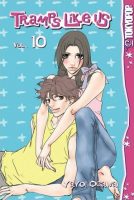 Tramps Like Us, Volumes 10-14 by Yayoi Ogawa. I am so glad that I made a point to collect Tramps Like Us when I did; the series is now very much out of print and unlikely to be rescued. (Although, considering the recent expansion in Kodansha’s digital offerings, there might yet be some hope there.) I’m really not sure why it took me so long to actually get around to reading Tramps Like Us, because I ended up loving the manga and its characters. The basic premise is somewhat strange and the series frequently takes off on flights of fantasy, but somehow the emotions and relationship dynamics still manage to be incredibly real and relatable. The final volume of the series did feel a little rushed to me, and everything might have been tied up a little too nicely, but I still found the slightly bittersweet but predominantly happy ending to be very satisfying. Some of the developments weren’t really that surprising; it was only a matter of time before Sumire and Momo/Takeshi had to face what their relationship had become and actually do something about it. Although she has to give some things up, Sumire is able to find a balance between her career, home life, and love life that makes her happy. And I have to admit, although it might ultimately be a little idealistic, the ending made me happy, too.
Tramps Like Us, Volumes 10-14 by Yayoi Ogawa. I am so glad that I made a point to collect Tramps Like Us when I did; the series is now very much out of print and unlikely to be rescued. (Although, considering the recent expansion in Kodansha’s digital offerings, there might yet be some hope there.) I’m really not sure why it took me so long to actually get around to reading Tramps Like Us, because I ended up loving the manga and its characters. The basic premise is somewhat strange and the series frequently takes off on flights of fantasy, but somehow the emotions and relationship dynamics still manage to be incredibly real and relatable. The final volume of the series did feel a little rushed to me, and everything might have been tied up a little too nicely, but I still found the slightly bittersweet but predominantly happy ending to be very satisfying. Some of the developments weren’t really that surprising; it was only a matter of time before Sumire and Momo/Takeshi had to face what their relationship had become and actually do something about it. Although she has to give some things up, Sumire is able to find a balance between her career, home life, and love life that makes her happy. And I have to admit, although it might ultimately be a little idealistic, the ending made me happy, too.
 Your Lie in April, Volume 8-9 by Naoshi Arakawa. As a musician, I’m naturally drawn to manga in which music is featured in some way. And so, because music plays a very prominent role in Your Lie in April, the series immediately caught my attention. Arakawa captures the deep emotional connection a person can have with music remarkably well in Your Lie in April. My own relationship with music is a complicated one, so I’m glad to see that sort of complexity reflected in the manga as well. Generally, however, the series does tend more towards the angst associated with performance rather than the joy of music. Many of the characters are pouring their whole selves into their art; being a musician can be both a thrilling and terrifying experience. Effectively expressing oneself through music is a tremendous accomplishment, but frequently this is accompanied by fear and worry that one will never be good enough. Still, there are wonderful moments in Your Lie in April in which the characters are able to break through their insecurities. While music is an important part of Your Lie in April, probably even more important are the relationships between the characters, even if Kosei still seems oblivious to the fact that he means so much to so many different people.
Your Lie in April, Volume 8-9 by Naoshi Arakawa. As a musician, I’m naturally drawn to manga in which music is featured in some way. And so, because music plays a very prominent role in Your Lie in April, the series immediately caught my attention. Arakawa captures the deep emotional connection a person can have with music remarkably well in Your Lie in April. My own relationship with music is a complicated one, so I’m glad to see that sort of complexity reflected in the manga as well. Generally, however, the series does tend more towards the angst associated with performance rather than the joy of music. Many of the characters are pouring their whole selves into their art; being a musician can be both a thrilling and terrifying experience. Effectively expressing oneself through music is a tremendous accomplishment, but frequently this is accompanied by fear and worry that one will never be good enough. Still, there are wonderful moments in Your Lie in April in which the characters are able to break through their insecurities. While music is an important part of Your Lie in April, probably even more important are the relationships between the characters, even if Kosei still seems oblivious to the fact that he means so much to so many different people.



